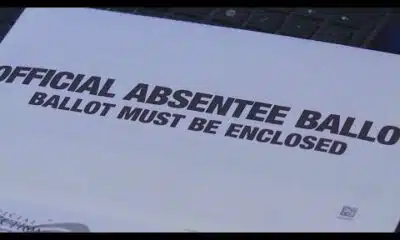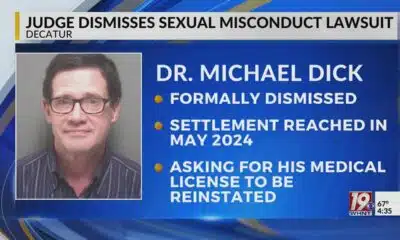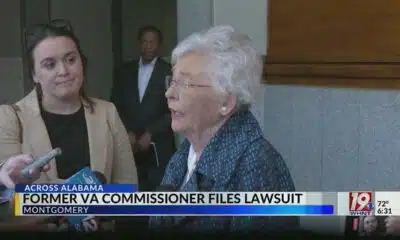Mississippi News
How much do Blue Cross, UMMC leaders make? It’s a secret.
How much do Blue Cross, UMMC leaders make? In Mississippi, that’s a secret.
While 50,000 Mississippians face the prospect of going without affordable medical care thanks to a contract dispute between the state’s largest hospital and insurer over reimbursement rates, the salaries for executives at both entities are shielded from the public.
Blue Cross & Blue Shield of Mississippi sued the state over a decade ago to make sure its executives’ compensation could not be disclosed, and the University of Mississippi Medical Center — despite being under the purview of the Institutions of Higher Learning and receiving state and federal funding — cites a broad exemption in state law when withholding its top administrators’ salary information.
Blue Cross & Blue Shield of Mississippi is required to file information about its executives’ compensation as part of its annual report to the Mississippi Insurance Department. But in 2009, the insurer sued the department to stop it from releasing that information to the public.
Several current executives at the company — Carol Pigott, the CEO; Thomas Fenter, the chief medical officer; and Bryan Lagg, senior vice president of consumer marketing and sales — are listed as plaintiffs in court filings.
Hinds County Chancery Court Judge Patricia D. Wise sided with Blue Cross, ordering the department “to withhold from public disclosure all information concerning the compensation of BCBSM executives.” Wise determined that the Insurance Department didn’t use the information to carry out its duties, so it isn’t a public record, and that disclosing the salary information would violate “the privacy rights of the individual plaintiffs/executives.”
Top executives make seven figures, a longtime former employee of the insurance company told Mississippi Today.
The median household income in Mississippi is around $46,000.
“Salaries and employee compensation of all employees at BCBSMS is not pertinent to the contract dispute with UMMC, and simply distracts from what is really important — high-quality, cost-effective care for our Members,” Cayla Mangrum, manager of corporate communications for the company, said in a statement to Mississippi Today.
But Mississippians faced with exorbitant health care costs or the added burden — financial and otherwise — of driving elsewhere for care might see it differently.
Court Order Bcbs by kate on Scribd
Carmen Balber, executive director of the nonprofit consumer advocacy group Consumer Watchdog, said that health insurance is essentially a public good, even when delivered through private companies.
“At the end of the day, we’re paying for those salaries,” she said, speaking about health insurance companies generally because she doesn’t have specific knowledge of BCBS Mississippi. “I’m certain that any consumer who’s had issues with their health insurance, paying for what they need, would be very interested to know that the CEO of the company was making $1 or $2 or $6 million a year.”
In many other states, that information is public record. In California, for example, an executive compensation report published annually on the company’s website shows their top executive made $6.4 million in 2020. In Michigan, the company’s CEO made $15.6 million in 2021. A spokesperson for the Blue Cross Blue Shield Association, the umbrella group for 34 different BCBS companies, said they did not have information about the number of states in which BCBS executive compensation is withheld from the public.
A 2016 survey by the National Association of Insurance Commissioners of its members around the country found that insurance company compensation figures were kept confidential in at least 12 states, including Mississippi.
The company awards yearly bonuses to employees — as much as six figures for executives — around March each year, said the former BCBS employee, and the amounts of the bonuses also increased in recent years.
The company told Mississippi Today the bonuses are “an important part” of incentive-based compensation.
“Blue Cross & Blue Shield of Mississippi (BCBSMS) is proud of our employee incentive program because it rewards (and thanks) our employees for their individual performance and contribution to the achievement of the Company’s health and wellness goals for our Members,” Mangrum said.
Though the University of Mississippi Medical Center receives about 9% of its funding from the state, the hospital shields its executives’ compensation, too. When Mississippi Today requested hospital salary information last year, UMMC invoked the broad hospital exemption in the state’s public records law to withhold the information. When reporters asked the Institutes of Higher Learning for the salary information this week, a spokesperson cited the law and said UMMC employees’ salaries are exempt from disclosure.
The salary for Dr. LouAnn Woodward, vice chancellor of health affairs and dean of the school of medicine, was $700,400 a year in 2016, according to a news article.
A 2021 report by the Economic Research Institute showed the average nonprofit hospital CEO made $600,000 in 2018.
On March 31, Blue Cross and UMMC missed their deadline to sign a new contract, forcing tens of thousands of patients to pay higher costs for out-of-network care at the hospital, or go elsewhere. UMMC maintains it has been underpaid relative to other academic medical centers in the region and is asking for a 30% overall increase in reimbursement rates from Blue Cross in the first year of a new contract. Blue Cross argues that’s too much.
Contract disputes between the two have been tense in the past, but this is the first time UMMC has gone out of network with Blue Cross, hospital officials said.
In 2009, reporters from WLBT requested information on Blue Cross Blue Shield executive compensation from the Insurance Department, on behalf of several policyholders who wanted to know where their money was going.
Blue Cross then sued the Insurance Department, triggering the court order in their favor.
Last week, Mississippi Today filed a records request with the Mississippi Insurance Department for the executive compensation information Blue Cross Blue Shield is required to file with the state annually. The department responded that the 2009 court order prohibits it from fulfilling the request.
“In accordance with the Court’s directive, MID is prohibited from releasing the aforementioned information which is the subject of your request,” wrote deputy commissioner Mark Haire.
Historically, public hospital records were exempt from public disclosure. But after Singing River Health System in Pascagoula secretly stopped paying into its pension system from 2009 to 2014 as it faced a hidden financial crisis, legislators moved to require greater transparency. Public hospitals are now required to share board meeting minutes and financial records. But employee salaries and personnel records are still exempt.
In a statement to Mississippi Today, Blue Cross said they make money not from customer premiums but from “administrative efficiency and investments.” They also said they outperform federal requirements for the percentage of customer premiums they spend on claims, a figure called the medical loss ratio. For large employer groups, the requirement is 85%; Blue Cross says it hit 94%. For individuals, the requirement is 80%, and Blue Cross reached 99%.
“Our medical loss ratio performance clearly illustrates Blue Cross & Blue Shield of Mississippi’s ability to ensure the vast majority of the Member’s premium is for health care costs,” the statement said.
In other states, legislatures have passed laws preventing disclosure of insurers’ executive compensation. Alabama, for example, used to release the information publicly. In 2015, following lobbying from the insurance industry, the law changed to make salaries confidential.
Alabama health care attorney Jim McFerrin told AL.com that making salary information public gave customers more information about where their money was going and could allow them to take legal action in certain situations – like, for example if they believed a rate increase was unreasonable.
“A decrease in transparency means a decrease in accountability,” he told the news site.
Mississippi Today reporter Molly Minta contributed to this report.
This article first appeared on Mississippi Today and is republished here under a Creative Commons license.
Mississippi News
Suspect in Charlie Kirk assassination believed to have acted alone, says Utah governor
SUMMARY: Tyler Robinson, 22, was arrested for the targeted assassination of conservative activist Charlie Kirk in Orem, Utah. Authorities said Robinson had expressed opposition to Kirk’s views and indicated responsibility after the shooting. The attack occurred during a Turning Point USA event at Utah Valley University, where Kirk was shot once from a rooftop and later died in hospital. Engravings on bullets and chat messages helped link Robinson to the crime, which was captured on grim video. The killing sparked bipartisan condemnation amid rising political violence. President Trump announced Robinson’s arrest and plans to award Kirk the Presidential Medal of Freedom.
The post Suspect in Charlie Kirk assassination believed to have acted alone, says Utah governor appeared first on www.wjtv.com
Mississippi News
Americans mark the 24th anniversary of the 9/11 attacks with emotional ceremonies
SUMMARY: On the 24th anniversary of the 9/11 attacks, solemn ceremonies were held in New York, at the Pentagon, and in Shanksville to honor nearly 3,000 victims. Families shared personal remembrances, emphasizing ongoing grief and the importance of remembrance. Vice President JD Vance postponed his attendance to visit a recently assassinated activist’s family, adding tension to the day. President Trump spoke at the Pentagon, pledging never to forget and awarding the Presidential Medal of Freedom posthumously. The attacks’ global impact reshaped U.S. policy, leading to wars and extensive health care costs for victims. Efforts continue to finalize legal proceedings against the alleged plot mastermind.
The post Americans mark the 24th anniversary of the 9/11 attacks with emotional ceremonies appeared first on www.wcbi.com
Mississippi News
Hunt for Charlie Kirk assassin continues, high-powered rifle recovered
SUMMARY: Charlie Kirk, conservative influencer and Turning Point USA founder, was fatally shot by a sniper during a speech at Utah Valley University on September 10, 2025. The shooter, believed to be a college-aged individual who fired from a rooftop, escaped after the attack. Authorities recovered a high-powered rifle and are reviewing video footage but have not identified the suspect. The shooting highlighted growing political violence in the U.S. and sparked bipartisan condemnation. Kirk, a Trump ally, was praised by political leaders, including Trump, who called him a “martyr for truth.” The university was closed and security heightened following the incident.
The post Hunt for Charlie Kirk assassin continues, high-powered rifle recovered appeared first on www.wjtv.com
-
News from the South - Arkansas News Feed7 days ago
Group in lawsuit say Franklin county prison land was bought before it was inspected
-
News from the South - Kentucky News Feed6 days ago
Lexington man accused of carjacking, firing gun during police chase faces federal firearm charge
-
The Center Square6 days ago
California mother says daughter killed herself after being transitioned by school | California
-
Mississippi News Video7 days ago
Carly Gregg convicted of all charges
-
Mississippi News Video7 days ago
2025 Mississippi Book Festival announces sponsorship
-
News from the South - Arkansas News Feed6 days ago
Arkansas medical marijuana sales on pace for record year
-
Local News Video6 days ago
William Carey University holds 'tailgates and tourniquets' blood drive
-
News from the South - Missouri News Feed6 days ago
Local, statewide officials react to Charlie Kirk death after shooting in Utah


















































